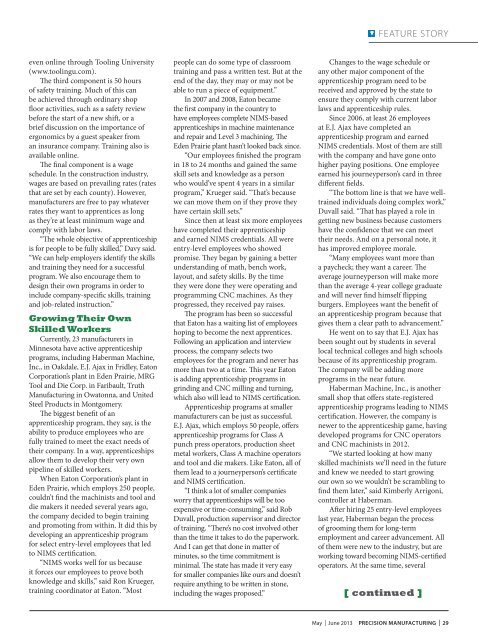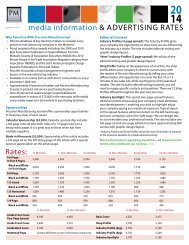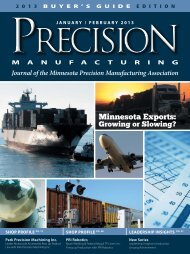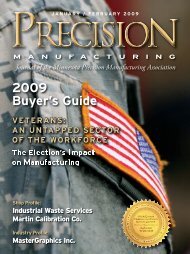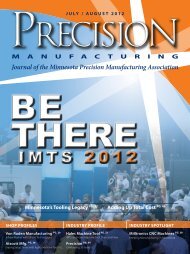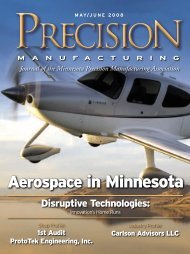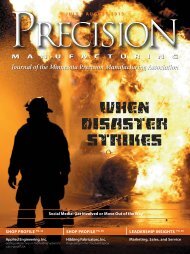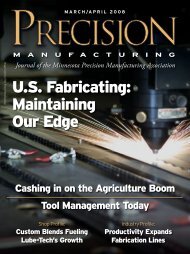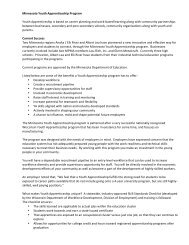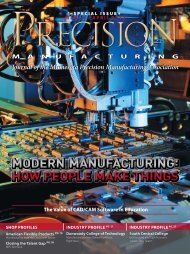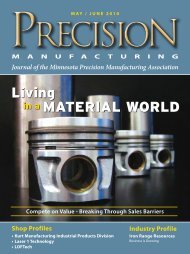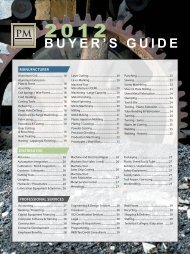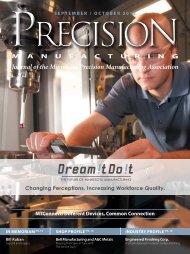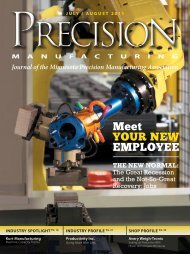JUNE 2013 - Minnesota Precision Manufacturing Association
JUNE 2013 - Minnesota Precision Manufacturing Association
JUNE 2013 - Minnesota Precision Manufacturing Association
- No tags were found...
Create successful ePaper yourself
Turn your PDF publications into a flip-book with our unique Google optimized e-Paper software.
FEATURE STORYeven online through Tooling University(www.toolingu.com).The third component is 50 hoursof safety training. Much of this canbe achieved through ordinary shopfloor activities, such as a safety reviewbefore the start of a new shift, or abrief discussion on the importance ofergonomics by a guest speaker froman insurance company. Training also isavailable online.The final component is a wageschedule. In the construction industry,wages are based on prevailing rates (ratesthat are set by each county). However,manufacturers are free to pay whateverrates they want to apprentices as longas they’re at least minimum wage andcomply with labor laws.“The whole objective of apprenticeshipis for people to be fully skilled,” Davy said.“We can help employers identify the skillsand training they need for a successfulprogram. We also encourage them todesign their own programs in order toinclude company-specific skills, trainingand job-related instruction.”Growing Their OwnSkilled WorkersCurrently, 23 manufacturers in<strong>Minnesota</strong> have active apprenticeshipprograms, including Haberman Machine,Inc., in Oakdale, E.J. Ajax in Fridley, EatonCorporation’s plant in Eden Prairie, MRGTool and Die Corp. in Faribault, Truth<strong>Manufacturing</strong> in Owatonna, and UnitedSteel Products in Montgomery.The biggest benefit of anapprenticeship program, they say, is theability to produce employees who arefully trained to meet the exact needs oftheir company. In a way, apprenticeshipsallow them to develop their very ownpipeline of skilled workers.When Eaton Corporation’s plant inEden Prairie, which employs 250 people,couldn’t find the machinists and tool anddie makers it needed several years ago,the company decided to begin trainingand promoting from within. It did this bydeveloping an apprenticeship programfor select entry-level employees that ledto NIMS certification.“NIMS works well for us becauseit forces our employees to prove bothknowledge and skills,” said Ron Krueger,training coordinator at Eaton. “Mostpeople can do some type of classroomtraining and pass a written test. But at theend of the day, they may or may not beable to run a piece of equipment.”In 2007 and 2008, Eaton becamethe first company in the country tohave employees complete NIMS-basedapprenticeships in machine maintenanceand repair and Level 3 machining. TheEden Prairie plant hasn’t looked back since.“Our employees finished the programin 18 to 24 months and gained the sameskill sets and knowledge as a personwho would’ve spent 4 years in a similarprogram,” Krueger said. “That’s becausewe can move them on if they prove theyhave certain skill sets.”Since then at least six more employeeshave completed their apprenticeshipand earned NIMS credentials. All wereentry-level employees who showedpromise. They began by gaining a betterunderstanding of math, bench work,layout, and safety skills. By the timethey were done they were operating andprogramming CNC machines. As theyprogressed, they received pay raises.The program has been so successfulthat Eaton has a waiting list of employeeshoping to become the next apprentices.Following an application and interviewprocess, the company selects twoemployees for the program and never hasmore than two at a time. This year Eatonis adding apprenticeship programs ingrinding and CNC milling and turning,which also will lead to NIMS certification.Apprenticeship programs at smallermanufacturers can be just as successful.E.J. Ajax, which employs 50 people, offersapprenticeship programs for Class Apunch press operators, production sheetmetal workers, Class A machine operatorsand tool and die makers. Like Eaton, all ofthem lead to a journeyperson’s certificateand NIMS certification.“I think a lot of smaller companiesworry that apprenticeships will be tooexpensive or time-consuming,” said RobDuvall, production supervisor and directorof training. “There’s no cost involved otherthan the time it takes to do the paperwork.And I can get that done in matter ofminutes, so the time commitment isminimal. The state has made it very easyfor smaller companies like ours and doesn’trequire anything to be written in stone,including the wages proposed.”Changes to the wage schedule orany other major component of theapprenticeship program need to bereceived and approved by the state toensure they comply with current laborlaws and apprenticeship rules.Since 2006, at least 26 employeesat E.J. Ajax have completed anapprenticeship program and earnedNIMS credentials. Most of them are stillwith the company and have gone ontohigher paying positions. One employeeearned his journeyperson’s card in threedifferent fields.“The bottom line is that we have welltrainedindividuals doing complex work,”Duvall said. “That has played a role ingetting new business because customershave the confidence that we can meettheir needs. And on a personal note, ithas improved employee morale.“Many employees want more thana paycheck; they want a career. Theaverage journeyperson will make morethan the average 4-year college graduateand will never find himself flippingburgers. Employees want the benefit ofan apprenticeship program because thatgives them a clear path to advancement.”He went on to say that E.J. Ajax hasbeen sought out by students in severallocal technical colleges and high schoolsbecause of its apprenticeship program.The company will be adding moreprograms in the near future.Haberman Machine, Inc., is anothersmall shop that offers state-registeredapprenticeship programs leading to NIMScertification. However, the company isnewer to the apprenticeship game, havingdeveloped programs for CNC operatorsand CNC machinists in 2012.“We started looking at how manyskilled machinists we’ll need in the futureand knew we needed to start growingour own so we wouldn’t be scrambling tofind them later,” said Kimberly Arrigoni,controller at Haberman.After hiring 25 entry-level employeeslast year, Haberman began the processof grooming them for long-termemployment and career advancement. Allof them were new to the industry, but areworking toward becoming NIMS-certifiedoperators. At the same time, several[ continued ]May | June <strong>2013</strong> PRECISION MANUFACTURING | 29


